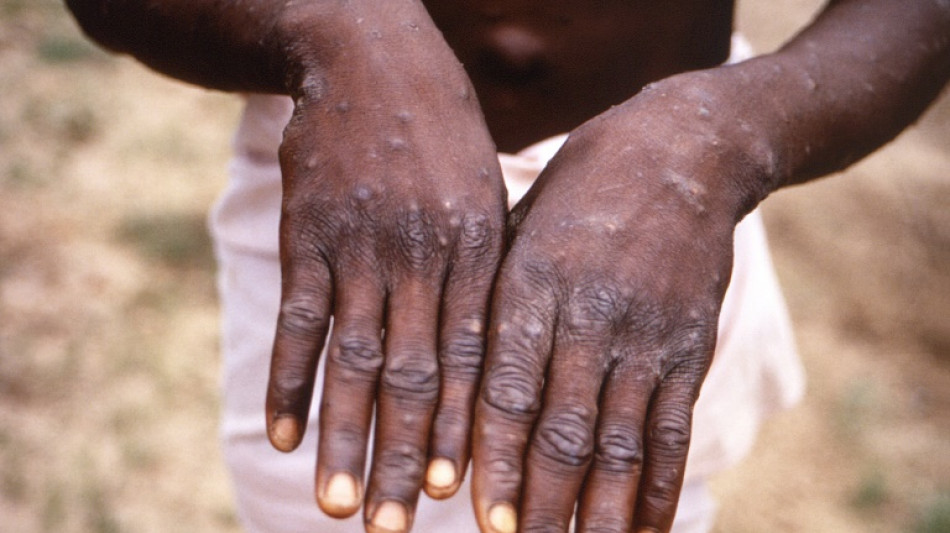
-
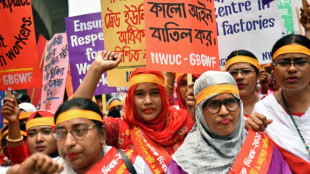 Bangladesh begins three days of mass political rallies
Bangladesh begins three days of mass political rallies
-
Children learn emergency drills as Kashmir tensions rise
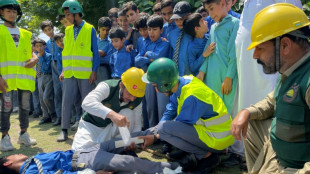
-
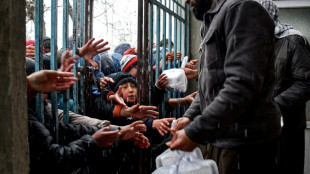 Millions of children to suffer from Trump aid cuts
Millions of children to suffer from Trump aid cuts
-
Veteran Wallaby Beale set for long-awaited injury return
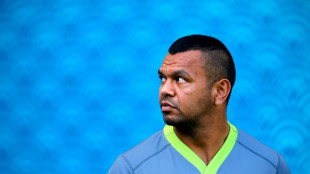
-
 Syria's Druze take up arms to defend their town against Islamists
Syria's Druze take up arms to defend their town against Islamists
-
Tesla sales plunge further in France, down 59% in April

-
 US calls on India and Pakistan to 'de-escalate'
US calls on India and Pakistan to 'de-escalate'
-
Israel reopens key roads as firefighters battle blaze

-
 Europe far-right surge masks divisions
Europe far-right surge masks divisions
-
James will mull NBA future after Lakers playoff exit

-
 Ukraine's chief rabbi sings plea to Trump to side with Kyiv
Ukraine's chief rabbi sings plea to Trump to side with Kyiv
-
Australian mushroom meal victim 'hunched' in pain, court hears

-
 Lakers dumped out of playoffs by Wolves, Rockets rout Warriors
Lakers dumped out of playoffs by Wolves, Rockets rout Warriors
-
Booming tourism and climate change threaten Albania's coast

-
 US reaching out to China for tariff talks: Beijing state media
US reaching out to China for tariff talks: Beijing state media
-
Tariffs prompt Bank of Japan to lower growth forecasts

-
 Kiss faces little time to set Wallabies on path to home World Cup glory
Kiss faces little time to set Wallabies on path to home World Cup glory
-
Serbian students, unions join forces for anti-corruption protest

-
 Slow and easily beaten -- Messi's Miami project risks global embarrassment
Slow and easily beaten -- Messi's Miami project risks global embarrassment
-
Fan in hospital after falling to field at Pirates game

-
 Nuclear power sparks Australian election battle
Nuclear power sparks Australian election battle
-
Tokyo stocks rise as BoJ holds rates steady

-
 Bank of Japan holds rates, lowers growth forecasts
Bank of Japan holds rates, lowers growth forecasts
-
'Sleeping giants' Bordeaux-Begles awaken before Champions Cup semis

-
 Napoli eye Scudetto as Inter hope for post-Barca bounce-back
Napoli eye Scudetto as Inter hope for post-Barca bounce-back
-
Germany's 'absolutely insane' second tier rivalling Europe's best

-
 PSG minds on Arsenal return as French clubs scrap for Champions League places
PSG minds on Arsenal return as French clubs scrap for Champions League places
-
UK WWII veteran remembers joy of war's end, 80 years on

-
 Myanmar junta lets post-quake truce expire
Myanmar junta lets post-quake truce expire
-
Rockets romp past Warriors to extend NBA playoff series

-
 Messi, Inter Miami CONCACAF Cup dream over as Vancouver advance
Messi, Inter Miami CONCACAF Cup dream over as Vancouver advance
-
UN body warns over Trump's deep-sea mining order

-
 UK local elections test big two parties
UK local elections test big two parties
-
US judge says Apple defied order in App Store case

-
 Seventeen years later, Brood XIV cicadas emerge in US
Seventeen years later, Brood XIV cicadas emerge in US
-
Scorching 1,500m return for Olympic great Ledecky in Florida

-
 Israel's Netanyahu warns wildfires could reach Jerusalem
Israel's Netanyahu warns wildfires could reach Jerusalem
-
Istanbul lockdown aims to prevent May Day marches

-
 Formation Metals Announces Appointment of Adrian Smith to Advisory Committee
Formation Metals Announces Appointment of Adrian Smith to Advisory Committee
-
Cerrado Gold Announces Q4 And Annual 2024 Financial Results

-
 Australian guard Daniels of Hawks named NBA's most improved
Australian guard Daniels of Hawks named NBA's most improved
-
Mexico City to host F1 races until 2028

-
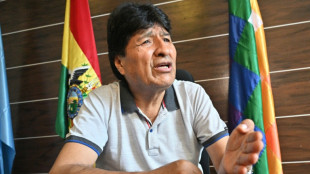 Morales vows no surrender in bid to reclaim Bolivian presidency
Morales vows no surrender in bid to reclaim Bolivian presidency
-
Ukraine, US sign minerals deal, tying Trump to Kyiv
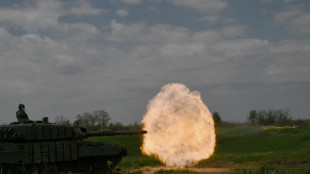
-
 Phenomenons like Yamal born every 50 years: Inter's Inzaghi
Phenomenons like Yamal born every 50 years: Inter's Inzaghi
-
Ukraine, US say minerals deal ready as Kyiv hails sharing
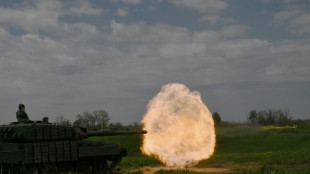
-
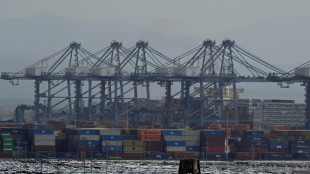 Global stocks mostly rise following mixed economic data
Global stocks mostly rise following mixed economic data
-
O'Sullivan says he must play better to win eighth snooker world title after seeing off Si Jiahui

-
 Sabalenka eases past Kostyuk into Madrid Open semis
Sabalenka eases past Kostyuk into Madrid Open semis
-
Netflix's 'The Eternaut' echoes fight against tyranny: actor Ricardo Darin


No concern yet monkeypox will cause pandemic: WHO
The WHO said Monday it was not concerned for now that the spread of monkeypox beyond the African countries where it is typically found could spark a global pandemic.
Since Britain first reported a confirmed monkeypox case on May 7, nearly 400 suspected and confirmed cases have been reported to the World Health Organization in nearly two dozen countries far from the states where the virus is endemic.
The UN health agency has voiced concern at this "unusual situation", but reiterated Monday that there was no reason to panic over the virus, which spreads through close contact and usually does not cause severe disease.
Asked during an epidemiological briefing whether the virus, which is endemic in a range of west and central African nations, might provoke another pandemic, WHO's top monkeypox expert Rosamund Lewis acknowledged that "we don't know."
But "we don't think so," she said. "At the moment, we are not concerned of a global pandemic."
It was important, she said, to take rapid steps to rein in the spread of the virus.
"It is still possible to stop this outbreak before it gets larger," she told an online public forum.
"I don't think we should be scared collectively."
Monkeypox is related to smallpox, which killed millions around the world every year before it was eradicated in 1980.
But monkeypox is much less severe, and most people recover within three to four weeks.
The initial symptoms include a high fever, swollen lymph nodes and a blistery chickenpox-like rash.
- 'Not a gay disease' -
Experts are trying to determine why the virus has suddenly begun spreading in countries where it has never been seen before, and mainly among young men.
One theory is that monkeypox is spreading more easily among people under the age of 45, who would not have been vaccinated against smallpox.
Vaccines developed for smallpox have also been found to be about 85 percent effective in preventing monkeypox, but they are in short supply.
Experts worry monkeypox could take advantage of the gaps in global immunity to fill the smallpox void.
"We are concerned that it will replace smallpox and we really don't want that to happen," said Lewis, who also heads WHO's smallpox secretariat.
She stressed the importance of raising awareness among those who might be at risk, detecting cases early, isolating those infected and tracking their contacts.
"If we all react quickly, and we all work together, we will be able to stop this ... before it reaches more vulnerable people," she said.
So far, many of the cases have been linked to young men who have sex with men.
Experts stress there is no evidence that monkeypox is transmitted sexually, but suggest there may have been several so-called amplifying events where members of the LGBTQ community have been gathered in close proximity.
"This is not a gay disease," Andy Seale of WHO's sexually transmitted infections programme told the public forum, stressing that the virus could spread among any group of people in crowded spaces with close skin-to-skin contact.
Sylvie Briand, WHO's epidemic and pandemic preparedness and prevention chief, acknowledged that "respiratory transmission" was also happening.
But she said it still remained unclear if that transmission was "mostly through droplets or could be airborne."
"There are still many unknowns," she said told Monday's epidemiological briefing.
A.Malone--AMWN